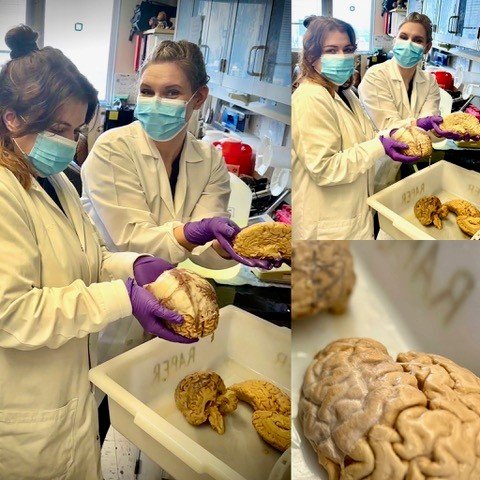- Recently Published Papers -
Exercise, APOE Genotype, and Testosterone Modulate Gut Microbiome–Cognition Associations in Prostate Cancer Survivors
Jacob Raber, Abigail O’Niel, Kristin D. Kasschau, Alexandra Pederson, Naomi Robinson, Carolyn Guidarelli, Christopher Chalmers, Kerri Winters-Stone, & Thomas J. Sharpton
Extinction of Contextual Fear Memory and Passive Avoidance Memory and Subsequent Anxiety-like and Depressive-like Behavior of A53T and A53T-L444P Mice
Emily Bunnell, Elizabeth Saltonstall, Alexandra Pederson, Charlie Baxter, Elia Ramicciotti, Naomi Robinson, Phoebe Sandholm, Abigail O Niel & Jacob Raber
α-klotho as a biomarker of amyloid β levels in the cerebrospinal fluid
Jacob Raber, Alexandra Pederson, Emily Bunnell, Nora Mattek, Nora E. Gray, Steven G. Kohama, Alison R. Weiss, Joseph F. Quinn, Henryk F. Urbanski
Effects of West Nile virus on behavioral and cognitive performance, cortical Aβ pathology, viral loads, and immune measures of middle-aged NL-G-F/E3 and NL-G-F/E4 mice
Abigail O’niel, Christopher J Parkins, Alexandra Pederson, Elizabeth Saltonstall, Emily Bunnell, Ria Aggarwal, Phoebe Sandholm, Kat Kessler, Henry F. Harrison, Jessica L Smith, Alec J. Hirsch & Jacob Raber
ApoE Isoform-Dependent Effects on Extinction of Contextual Fear Memory and Passive Avoidance Memory
Elizabeth Saltonstall, Alexandra Pederson, Abigail O’niel, Sarah Holden, Kat Kessler, Eileen Ruth Samson Torres & Jacob Raber
World no-tobacco: effects of second-hand smoke (SHS) and vapors on the developing and adult brain
Glen Kisby & Jacob Raber
Effects of COVID-19 virus-like particles on the behavioral and cognitive performance of human apolipoprotein E targeted replacement mice
Abigail O’Niel, Alexandra Pederson, Elizabeth Saltonstall, Kayla Nguyen, Monzerrat Pantoja, Mitali Chaudhari, Phoebe Sandholm, Eric Yoon, Henry F. Harrison, Sydney Boutros, Alec J. Hirsch, & Jacob Raber
Effects of photon irradiation in the presence and absence of hindlimb unloading on the behavioral performance and metabolic pathways in the plasma of Fischer rats
Jacob Raber, Sarah Holden, Kat Kessler, Breanna Glaeser, Chloe McQuesten, Mitali Chaudhari, Fiona Stenzel, Marek Lenarczyk, Scott Willem Leonard, Jeffrey Morre, Jaewoo Choi, Amy Kronenberg, Alexander Borg, Andy Kwok, Jan Frederik Stevens, Christopher Olsen, Jeffrey S. Willey, Gerd Bobe, Jessica Minnier, & John E. Baker
-Raber Lab News-
Updated opportunities for graduate students and post-doctoral fellows. “Neuroscience of Aging, Neurodegeneration and Alzheimer's Disease” NIAA T32 (MPIs Raber, Urbanski) renewed (2023-2028).
Raber Lab 2025
Based on what we learn in the rodent models and in nonhuman primate models, we develop tests and treatment strategies to improve brain function in humans suffering from these conditions. Routinely, we use a combination of behavioral, neuroendocrinological, pharmacological, neurochemical, immunohistochemical, cellular, and molecular approaches. For example, as part of collaborative efforts, we perform unbiased omics approaches to determine whether the behavioral and cognitive alterations are associated with alterations in specific pathways and whether behavioral and cognitive measures are related to specific biomarkers. As part of translation research, we developed and use humanized versions of the mouse object recognition and spatial navigation tests. These tests might be valuable in identifying biomarkers of cognitive function, of response to interventions, and susceptibility to cognitive impairments.
Raber Lab 2023
Established at OHSU in 2001, the Raber Lab focuses on effects of genetic factors, such as apoE, and environmental factors, including irradiation, immunotherapy, chemotherapy, a Western diet, environmental toxins, and other stressors, on brain structure and function in experimental rodent models of human neurological diseases.
Raber Lab 2024
NW Noggin visits the Raber Lab 2023
Top view of blood vessels sitting on the surface of a in-vivo mouse cortex.





